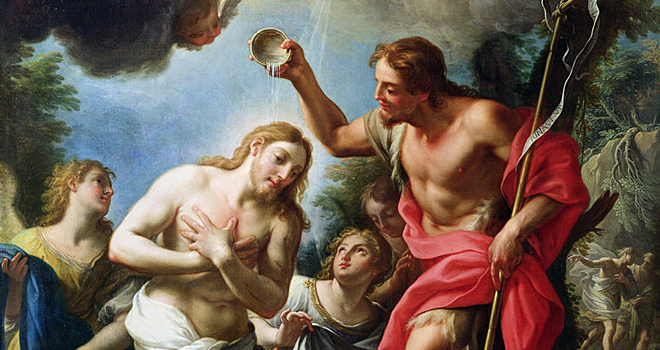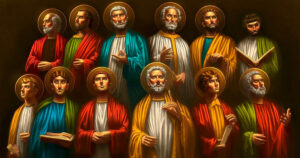A remarkable thing happened after Jesus was baptized by John in the Jordan River: God poured out His Spirit on His beloved Son.
Matthew 3:16-17 (NASB) After being baptized, Jesus came up immediately from the water; and behold, the heavens were opened, and he saw the Spirit of God descending as a dove and lighting on Him, 17 and behold, a voice out of the heavens said, “This is My beloved Son, in whom I am well-pleased.”
Father, Son and Holy Spirit
Many Christians view this passage as a proof text for the doctrine of the Trinity because in it we see God the Father (represented by the “voice out of the heavens”), Jesus, and the Spirit of God. But does the presence of the three constitute sufficient evidence for the doctrine? As we saw in the previous post regarding Matthew 28:19, a passage must do more than simply list three persons in order to qualify as a proof text, otherwise, passages like the ones that speak of Abraham, Isaac and Jacob would qualify. To be a valid proof text for the doctrine of the Trinity it must actually teach us something about who God is and the connection between the Father, Son and Spirit. For example, the passage needs to demonstrate at least one of the following tenets[1]:
- the three persons are of one substance (consubstantial)
- each person is fully God, yet there are not three Gods
- each person shares all of the divine attributes, and they are equally worshiped (co-equal)
- each person is eternal and uncreated (co-eternal)
With this in mind, it doesn’t take long for us to see that the passage in question does not qualify as a Trinitarian proof text since it says nothing that would support even the basic elements of the doctrine. For instance, we’re not told that the Father, Son and the Spirit share the same God-substance. We’re not told that although there are three listed, they comprise only one God. Furthermore, there is no mention of them sharing divine attributes or of being co-eternal, and so forth. Not only does the passage fail to meet the criteria for being a proof text, it raises serious concerns for the doctrine itself. If Jesus is God, why does he need to be baptized with the Spirit of God? Is that even possible? Some may claim that Jesus needed to be filled with the Spirit because he set aside his deity when he “emptied himself” as reported in Philippians 2:5-11. Apart from the fact that this is not stated in the context of Paul’s epistle, it makes no sense. And according to Trinitarian minister, Matt Perman, it is impossible:
…Jesus did not give up any of his divine attributes at the incarnation. He remained in full possession of all of them. For if he were to ever give up any of his divine attributes, he would cease being God.[2]
If the incarnated Jesus remained in full possession of his divine attributes, why would he, as God the Son, need to be filled with God the Spirit? Why would Jesus “take off God” only to put “God back on?” This question remains without a satisfactory answer. On the other hand, if Jesus is the human Messiah, to which Scripture repeatedly attests[3], and not a God-Man, which Scripture never calls him, it makes perfect sense that he would need the Spirit of God to do the work of the ministry.
Another question arises from reading Jesus’ baptismal account through a Trinitarian lens: if Jesus is God, why does God the Father say He is well-pleased with God the Son? Isn’t God always pleased with God? Could God ever be displeased with God? Doesn’t God the Son always do what is right? Again, it makes no sense. However, if Jesus is the human messiah, as Scripture teaches, then it is quite reasonable that God would be pleased that he took the first step of public obedience in his journey to the cross.
The Spirit of God is not a separate person from God
 When we compare Matthew 3:16-17 with Luke’s account, we discover what is perhaps the most intriguing problem about the passage: the Holy Spirit is not a separate person:
When we compare Matthew 3:16-17 with Luke’s account, we discover what is perhaps the most intriguing problem about the passage: the Holy Spirit is not a separate person:
Luke 3:21-22 (NASB) Now when all the people were baptized, Jesus was also baptized, and while He was praying, heaven was opened, 22 and the Holy Spirit descended upon Him in bodily form like a dove, and a voice came out of heaven, “You are My beloved Son, in You I am well-pleased.” (emphasis added)
Here we see that term “Spirit of God” used in Matthew’s account is synonymous with the term “Holy Spirit” used in Luke’s account. Common sense tells us that the Spirit of God is not a separate person from God, just as the spirit of Elijah is not a separate person from Elijah,[4] and your spirit is not a separate person from you. Therefore, there is no third person present at the baptism, and thus no Trinity.
Some may argue that John’s account of Jesus’ baptism refers to the Spirit as a “He” thus “proving” that it is a separate person.
John 1:32 (NASB) John testified saying, “I have seen the Spirit descending as a dove out of heaven, and He remained upon Him. (emphasis added)
However, upon closer examination we see the translators’ have imposed their bias onto the text. The word “Spirit” in the Greek is pneuma and it means: wind, breath, spirit. Greek, as in other languages, assigns a gender and referring pronouns to all nouns: masculine (he), feminine (she), or neuter (it). The word pneuma (spirit) is neuter so when it is translated into English the referring pronoun is “it.” But in John 1:32, many Bible translators assign a masculine pronoun to pneuma (spirit), and capitalize it so as to give the reader the impression that the Spirit is a person.[5] However, this is not in keeping with basic translation principles. Thankfully, numerous versions[6] rightly translate Spirit (pneuma) as an “it” in keeping with its neuter gender. The following are a few examples:
English Standard Version – And John bore witness: “I saw the Spirit (neuter gender) descend from heaven like a dove, and it remained on him. (emphasis added)
King James Bible – And John bare record, saying, I saw the Spirit (neuter gender) descending from heaven like a dove, and it abode upon him. (emphasis added)
Young’s Literal Translation – And John testified, saying — ‘I have seen the Spirit (neuter gender) coming down, as a dove, out of heaven, and it remained on him (emphasis added)
Numerous other translations[7] simply drop the pronoun all together. For example:
New International Version – Then John gave this testimony: “I saw the Spirit come down from heaven as a dove and remain on him.
Berean Study Bible – Then John testified, “I saw the Spirit descending from heaven like a dove and resting on Him.
Some try to claim that “it” refers to the dove. But dove in Greek is peristera which carries a feminine gender and would be translated, “she remained on him.” Thus, in John’s account we see the translators’ bias at work.
In conclusion, Matthew 3:16-17 does not qualify as a proof text for the doctrine of the Trinity because it does not convey any of its tenets. Furthermore, the text raises serious concerns if read through a Trinitarian lens. How can God the Son be filled with the Spirit of God? How can God the Father be anything but pleased with God the Son? Moreover, despite the translators’ bias in John’s account, a comparison between Matthew and Luke’s accounts reveals that there aren’t three persons at Jesus’ baptism because the Spirit of God is not a distinct person from God. On the other hand, if read without superimposing the 4th century doctrine onto the text, it makes perfect sense that God would be pleased with His human Messiah for submitting to water baptism as he began his ministry in the power of God’s Spirit.
[1] These tenets can be found along with the full text of the Athanasian Creed at Christ Reformed Church, accessed 5-9-19, https://www.crcna.org/welcome/beliefs/creeds/athanasian-creed
[2] Matt Perman, “How Can Jesus Be God and Man?” DesiringGod.com accessed 05-11-19, https://www.desiringgod.org/articles/how-can-jesus-be-god-and-man
[3] Jesus is human: John 8:40; Acts 2:22; 1 Timothy 2:5; Acts 10:38, etc.
[4] 2 Kings 2:9. See also spirit of Zerubbabel and the spirit of Joshua, Haggai 1:14.
[5] For the record, the word Spirit in Hebrew is ruach. It is assigned a female gender with the referring pronoun “she.” Not surprisingly, we never see translators mistranslating Spirit as a “she” in the Old Testament since it does not support their bias.
[6] Some of the versions that translate pneuma as “it”: Berean Literal Bible; International Standard Version, Revised Standard Version, American Standard Version, English Revised Version, Webster’s Bible, Weymouth New Testament, World English Bible, NET Bible, New Heart English Bible, Jubilee Bible, Darby Bible
[7] Some of the versions that drop the pronoun altogether: Complete Jewish Bible, J.B. Phillips Translation, Geneva Bible of 1599, New Living Translation, Contemporary English Version, Good News Translation, Aramaic Bible in Plain English, God’s Word Translation, One God, One Messiah Translation, New Living Translation; Tyndale Bible, Lexham Bible




You really tackled and explained tough questions! (I might add VERY well.) Thank for all the time spent in research! May God continue to bless you as you bless us.
Thanks for stopping by the website and for your encouragement! I appreciate the interest and the kind words.
Blessings!
One God Worship
Can you give me commentary on John 17:5
Hey Gary, my internet is working now so I’ll answer here as well in case someone else can benefit. Here is the link to my article on John 17:5
God bless,
OGW